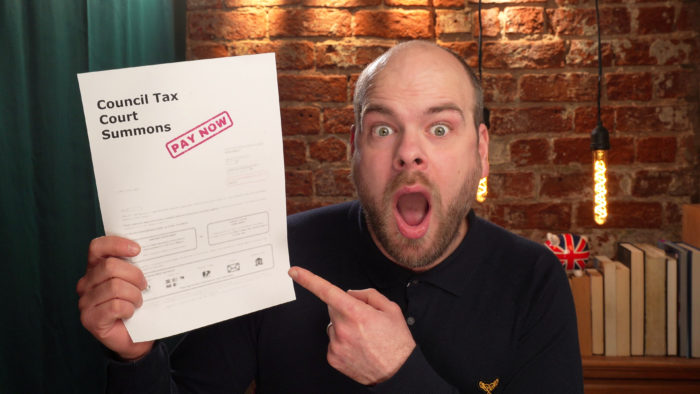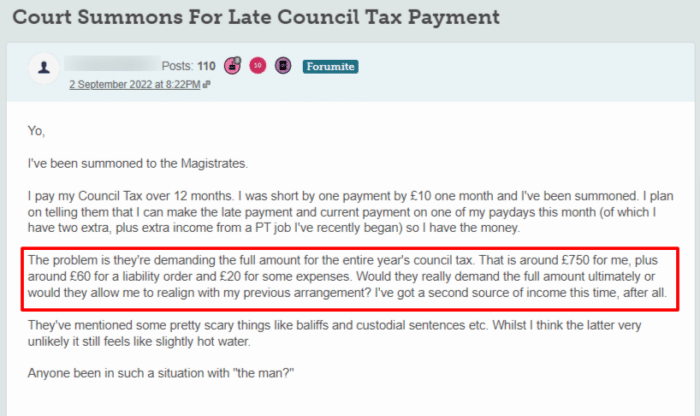Council Tax Court Summons Letter – Can You Ignore It?
For free & impartial money advice you can visit MoneyHelper. We work with The Debt Advice Service who provide information about your options. This isn’t a full fact-find, some debt solutions may not be suitable in all circumstances, ongoing fees might apply & your credit rating may be affected.

For free & impartial money advice you can visit MoneyHelper. We work with The Debt Advice Service who provide information about your options. This isn’t a full fact-find, some debt solutions may not be suitable in all circumstances, ongoing fees might apply & your credit rating may be affected.
Dealing with council tax debt can feel tough. But don’t worry; you’re at the right place to find help.
Every month, over 170,000 people visit our website for guidance on debt solutions, so you’re not alone in your struggle.
In this article, we’ll explain in a simple way:
- What to do if you’re finding it hard to pay your council tax.
- How to understand council tax bands.
- How to ask the council to let you off your council tax debt.
- How not paying your council tax can change your credit score.
- The legal issues if you don’t pay your council tax.
We’re here to help you understand everything you need to know. Remember, it’s not a good idea to ignore a council tax court summons letter as it can lead to big legal problems. But don’t worry; we’ll guide you through what to do if you’re facing this situation.
Let’s get started!
Why Have I Received a Court Summons Letter for Council Tax?
Don’t Ignore a Council Tax Summons Letter!

How a debt solution could help
Some debt solutions can:
- Stop nasty calls from creditors
- Freeze interest and charges
- Reduce your monthly payments
A few debt solutions can even result in writing off some of your debt.
Here’s an example:
Situation
| Monthly income | £2,504 |
| Monthly expenses | £2,345 |
| Total debt | £32,049 |
Monthly debt repayments
| Before | £587 |
| After | £158 |
£429 reduction in monthly payments
If you want to learn what debt solutions are available to you, click the button below to get started.
Are You Struggling with Council Tax Debt?
What Does a Court Summons Mean for Council Tax?
Thousands have already tackled their debt
Every day our partners, The Debt Advice Service, help people find out whether they can lower their repayments and finally tackle or write off some of their debt.

Natasha
I’d recommend this firm to anyone struggling with debt – my mind has been put to rest, all is getting sorted.
Reviews shown are for The Debt Advice Service.
Do You Have to Attend a Court Summons for Council Tax?
Should I Attend Court to Dispute my Council Tax Charge?
Can I be Jailed for Not Paying Council Tax?
» TAKE ACTION NOW: Fill out the short debt form
What if I Ignore a CCJ for Council Tax?
Attachment of Earnings Order
Attachment of Earnings Orders are legally binding.
This means that failure to comply with an AEO may result in a fine or, in extreme cases, even imprisonment.
Benefit Deductions
Bailiffs
These fees are generally quite similar, and some bailiff charges are even standardised. County Court bailiffs, for example, have set fees of £75 for a Notice of Enforcement and £235 if they have to actually enforce the debt.
Keep in mind that the enforcement fee can be a bit higher. Usually, they will charge an extra 7.5% of your debt if that debt is over £1,000.
This means that if you have a debt of £1,500 that you don’t pay, you will be charged:
- £75 for Notice of Enforcement
- £235 for Enforcement
- £112.50 for the 7.5% over £1,000.
Total: £422.50.
Charging Orders
Bankruptcy
What Can I Do if I Can’t Pay?
Can I Write off My Council Tax Debt?
You might be able to write off some of your council tax debts wiht a debt solution. Even if these debts can’t be covered, getting a debt solution might help you get back in control of your finances enough to pay back the council.
There are several different debt solutions available in the UK, so I recommend speaking to a debt charity as soon as possible. Their advisors will be able to look at your finances in detail and help you work out which debt solution will work best for you.
I have linked a few charities that offer these advisory services for free below.
Individual Voluntary Arrangement (IVA)
An IVA is a formal agreement between you and your creditors. You agree to pay a monthly sum that is distributed amongst your debts, and your creditors agree not to contact you during your IVA.
IVAs typically last for 5 or 6 years, and any outstanding debt is wiped off when it ends.
Keep in mind that IVAs are not suitable for everyone. You need to owe several thousand pounds to more than one creditor to be eligible. You also need to demonstrate that you have some disposable income every month.
Trust Deed
IVAs are not available in Scotland. Instead, you will need to opt for a Trust Deed.
Trust Deeds work in the same way as an IVA – you pay an agreed sum each month that is shared amongst your creditors, they can’t contact you, and any leftover debt at the end of your Trust Deed term is written off.
Debt Relief Order (DRO)
A DRO is a good option for those facing financial hardship with no assets and little income.
For 12 months, you make no payments, but your creditors freeze your interest and don’t contact you.
If your finances haven’t improved during this year, you may be able to write off your unsecured debts.
Bankruptcy
If you have debts but no realistic possibility of ever paying them off, you may need to declare bankruptcy.
Bankruptcy has an unfair stigma attached to it as it may be your only way of getting a financial fresh start. That said, it is a serious financial situation that should not be taken lightly.
Sequestration
Sequestration is the Scottish version of bankruptcy.
If you have little income and no valuable assets, you may be able to apply for a minimal asset process bankruptcy (MAP). A MAP is a quicker, cheaper, and more straightforward version of sequestration, so worth considering.


